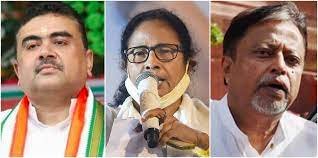In a recent development, the lone Congress MLA from West Bengal has defected to the Trinamool Congress (TMC), causing ripples in the political landscape of the state. However, Chief Minister Mamata Banerjee, who is also the TMC chairperson, sought to downplay the significance of this event by categorizing it as a local issue rather than a reflection of the broader dynamics between opposition parties.
Addressing the media on Tuesday, Mamata Banerjee emphasized the unity of opposition parties at the national level, stating, “We are all together at the national level.” She urged all parties to understand the unique obligations of state parties, hinting at the necessity for regional parties to prioritize their regional interests. This statement can be seen as an attempt to maintain a united front against the ruling party at the center while acknowledging the diverse dynamics within the state.
The defection in question involves Bayron Biswas, the Congress MLA elected to the West Bengal State Assembly on March 2, 2023. On Monday, he officially joined the TMC, marking a significant shift in his political allegiance. However, Mamata Banerjee dismissed the incident as a local matter, indicating that the defection of one MLA does not undermine the larger unity among opposition parties at the national level.
Political defections are not uncommon in Indian politics, where politicians often switch parties in pursuit of personal or political gain. While these events can have local implications, they can also serve as a reflection of broader political realignments and power dynamics. In this case, the defection of Bayron Biswas may indicate a weakening of the Congress party’s position in West Bengal, as well as the TMC’s ongoing efforts to consolidate power and expand its political base.
The Congress party, which was once a formidable force in West Bengal politics, has faced setbacks in recent years. In the 2021 state assembly elections, the TMC secured a resounding victory, securing a third consecutive term in office. The Congress, on the other hand, faced a significant decline in its electoral performance, winning only two seats out of the 292 contested. This decline has prompted speculation about the party’s future in the state and its ability to compete against the dominant TMC.
Mamata Banerjee’s statement regarding the defection emphasizes the need for regional parties to prioritize their state-level concerns while maintaining a united front against the ruling party at the national level. This approach reflects the complex nature of Indian politics, where alliances and loyalties can vary at different levels of governance. It also highlights the delicate balance that political leaders must maintain in navigating the intricacies of regional and national politics.
While Mamata Banerjee’s characterization of the defection as a local issue may be aimed at minimizing its impact, it also underscores the evolving dynamics within West Bengal’s political landscape. As the TMC seeks to consolidate its position and expand its influence, defections from rival parties can provide the party with a boost in terms of numbers and support. On the other hand, for the Congress party, losing a legislator further weakens its already diminished presence in the state.
The defection of the lone Congress MLA to the TMC serves as a reminder of the fluid nature of politics and the challenges faced by opposition parties in maintaining unity and countering the ruling party. It remains to be seen how this development will shape the political landscape of West Bengal and whether it will have any wider implications for the opposition’s prospects in the state.


